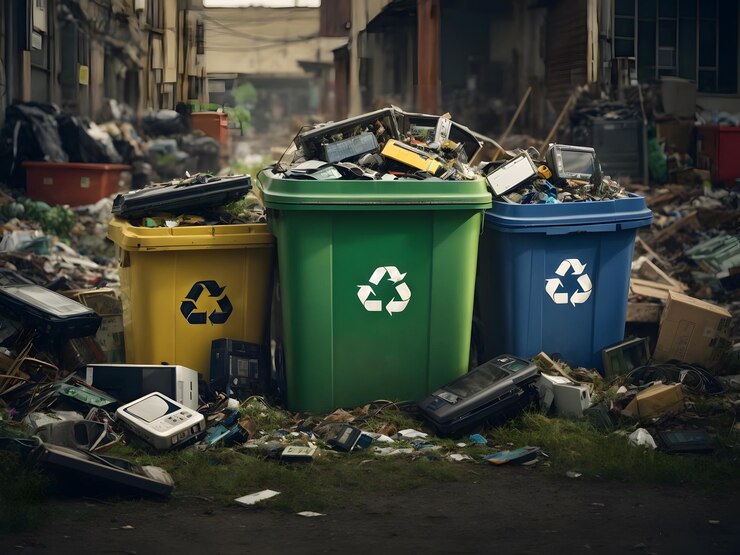
Did you know that India is one of the world’s largest producers of electronic waste? This surge is due to several factors:
- The rapid pace of technological advancements
- The growing affordability of electronic devices
- The country’s large population
The average lifespan of gadgets such as smartphones and laptops has decreased due to the continuous introduction of new models with improved features, leading to millions of electronic machines being disposed of annually. It is a major environmental concern, as e-waste contains hazardous components that can pollute the air, water, and soil if not properly managed. Therefore, addressing this issue is crucial for India’s sustainable development. This blog will give seven obvious reasons why e-waste recycling is essential for India.
Importance Of E-waste Recycling In India For Sustainable Development-
- Environmental Protection
E-waste contains hazardous materials like mercury, lead, and cadmium, which can infect soil and water if disposed of improperly. These toxic substances can harm plants, animals, and even humans. Lead can contaminate water supplies and harm wildlife, while mercury can impair neurological development in humans and animals. Recycling e-waste helps prevent these toxic substances from entering the environment, protecting our natural resources and maintaining a healthy ecosystem.
For example, When e-waste is thrown into landfills, rainwater can wash these dangerous chemicals into the soil and groundwater, causing long-term damage. Proper recycling ensures these materials are managed safely, reducing the risk of environmental pollution.

- Resource Conservation
Electronic devices contain inexpensive materials such as copper, gold, silver, and rare earth elements. These materials are limited, and mining them is costly and damaging to the environment. Recycling e-waste allows us to recover these precious materials, reducing the need for new mining. It protects natural resources and reduces the environmental impact of mining activities, such as deforestation, habitat destruction, and water pollution.
For example, a metric ton of circuit boards can contain up to 800 times more gold than an ore. Recycling these components can greatly alleviate the pressure on natural resources and foster a more sustainable economy.
- Energy Savings
Recycling e-waste uses significantly less energy than producing new products from raw materials. For example, recycling aluminium saves up to 95% of the energy required to create new aluminium from bauxite ore. Similarly, recycling copper can save up to 85% of the energy required for primary production. By recycling e-waste, we can reduce energy consumption, lower greenhouse gas emissions, energy conservation and the fight against climate change.
- Economic Growth
E-waste recycling Company in India can create job opportunities and stimulate economic growth. The recycling industry can employ people in various roles, from collection and sorting to processing and refurbishing. This provides employment and supports the growth of a sustainable economy by fostering new business opportunities in the recycling sector. Additionally, recycling can reduce costs for manufacturers by providing a steady supply of recycled materials.
In India, the e-waste recycling industry can create thousands of jobs, particularly in urban areas where e-waste generation is highest. By investing in recycling infrastructure and developing a skilled workforce, India can build a robust recycling industry that contributes to economic development and sustainability.
- Public Health
Improper e-waste disposal can release toxic substances, posing serious health risks to the public. Exposure to harmful chemicals can cause to respiratory problems, skin disorders, and other health issues. Recycling e-waste properly helps manage these toxic substances, protecting public health and ensuring safer communities.
For example, informal e-waste recycling operations, often found in developing countries, can expose workers to harmful chemicals without proper safety measures. By promoting formal recycling practices, we can reduce the health risks associated with e-waste and improve the well-being of communities.
- Legal Compliance
India has implemented regulations to manage e-waste, such as the E-Waste (Management) Rules, 2016. These rules mandate proper handling, recycling, and disposal of e-waste. By recycling e-waste, businesses and individuals can comply with these regulations, avoiding legal penalties and contributing to a well-regulated waste management system. Compliance also helps build a positive reputation for environmentally responsible companies.
- Sustainable Development Goals (SDGs)
Recycling e-waste aligns with several United Nations Sustainable Development Goals (SDGs), such as responsible consumption and production (Goal 12), climate action (Goal 13), and life on land (Goal 15). By recycling e-waste, India can make significant progress towards achieving these goals, promoting a sustainable and resilient future for all. Recycling also supports the circular economy, where materials are reused and recycled, which reduces waste and the need for new raw materials.
Final Say!
E-waste recycling is crucial for India’s sustainable development. It offers a practical solution to the growing problem of electronic waste, helping to safeguard our environment and health. Moreover, it supports economic growth and aligns with global sustainability goals.
Reecollabb is a leading e-waste recycling company in India. It is committed to securing the environment and supporting sustainable practices. By choosing their services, you can help building India’s sustainable future. Let’s prioritize e-waste recycling for a better tomorrow.
Read Another Article:
How are E-Waste Management Services in UP Combatting Illegal Dumping?







